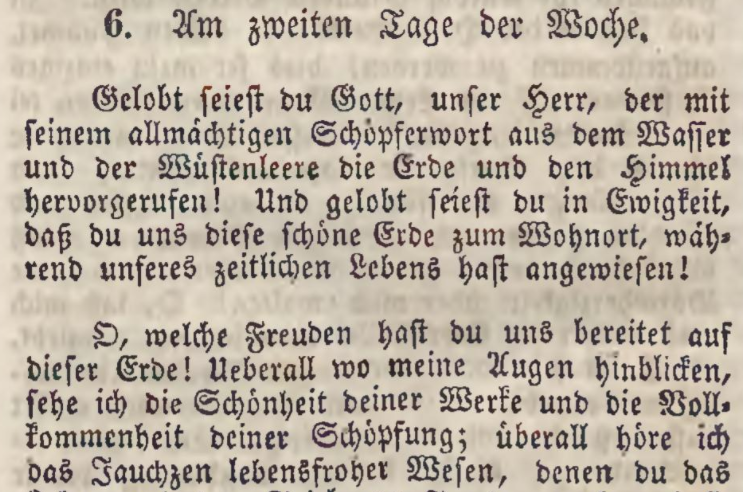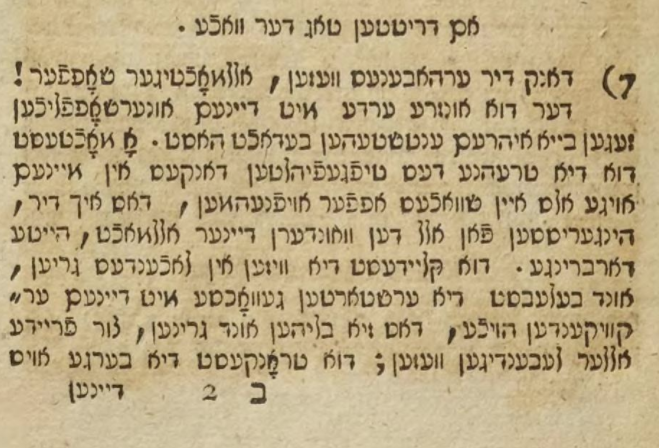| Source (German) | Translation (English) |
|---|---|
Am zweiten Tage der Woche. |
On the second day of the week. |
Gelobt seiest du Gott, unser Herr, der mit seinem allmächtigen Schöpferwort aus dem Wasser und der Wüstenleere die Erde und den Himmel hervorgerufen! Und gelobt seiest du in Ewigkeit, daß du uns diese schöne Erde zum Wohnort, während unseres zeitlichen Lebens hast angewiesen! |
Praise be to you God, our Lord, who with his almighty word of creation brought forth the earth and the sky from the water and the desolate waste! And praise be to you for Eternity, that you have given us this beautiful earth as our dwelling place during our temporal life! |
O, welche Freuden hast du uns bereitet auf dieser Erde! Ueberall wo meine Augen hinblicken, sehe ich die Schönheit deiner Werke und die Vollkommenheit deiner Schöpfung; überall höre ich das Jauchzen lebensfroher Wesen, denen du das Leben und den Trieb zur Freude gegeben hast. O, du Allgütiger, der du diese Millionen Wesen alle mit deiner überschwenglichen Güte überhäuft hast, lehre mich die Güter dieser Erde würdig schätzen, daß ich deine reichen Gaben, die du mit Vaterhuld so gnädig deinen Kindern spendest, nicht mißbrauchen möge. |
O, what joys you have prepared for us on this earth! Everywhere my eyes look, I see the beauty of your works and the perfection of your creation; everywhere I hear the rejoicing of joyful beings, to whom you have given life and the drive to joy. O All-Good One, who has showered these millions of beings with your abundant goodness, teach me to appreciate the goods of this earth, so that I may not misuse your rich gifts, which you so graciously bestow on your children with fatherly grace. |
Erde und Himmel hast du mit deinem allmächtigen Worte ins Dasein gerufen, so erzählt uns die Geschichte des zweiten Schöpfungstages in der heiligen Schrift, wer möchte die hohe und heilige Bedeutung dieser Worte verkennen, und allein die sichtbare Erde und den sichtbaren Himmel darunter verstehen; unsere verehrten Weisen haben auch den tiefen Sinn, der in diesen Worten liegt, in einem schönen Gleichniß ausgesprochen: Das Erdenleben, sagen sie, gleicht dem Vorzimmer eines Großen, und von dem würdigen Benehmen im Vorzimmer allein wird es abhängen, ob du in das Innere zu gelangen für würdig befunden werden wirst. In das Innere des Heiligthums, in deinen Himmel, aufgenommen zu werden, dies sei mein einziges Bestreben auf der Erde. |
Earth and heaven you have called into existence with your almighty word, so the story of the second day of creation tells us in the holy scriptures, who would want to misjudge the high and holy meaning of these words, and understand only the visible earth and the visible heaven by it; our honored sages have also expressed the deep meaning that lies in these words in a beautiful simile: Earthly life, they say, is like the antechamber of a great man, and it will depend on your dignified conduct in the antechamber alone whether you will be found worthy to enter the interior. To be accepted into the interior of the sanctuary, into your heaven, this is my only endeavor on earth. |
Mein ganzes Leben sei eine Vorbereitung für das bessere Leben, und habe ich die hohe Stufe der wahren Erkenntniß noch nicht erlangt, und sündige ich auch täglich und stündlich gegen deinen heiligen Willen, o so laß die Schaale deiner Gnade überwiegen, und deine Barmherzigkeit über mich walten! O, laß mich einst, wenn die Erdenhülle, die mich jetzt umgiebt, abgestreift sein wird, der ewigen Freuden theilhaftig werden, die du für deine Verehrer aufbewahrt hast, daß ich nach einem würdigen Erdenleben erwachend mich sättige in der Anschauung deiner Gottesgestalt. Amen. |
Let my whole life be a preparation for the better life, and if I have not yet attained the high level of true knowledge, and if I sin daily and hourly against your holy will, let the bowl of your grace prevail and your mercy rule over me! O, let me one day, when the earthly shell that now surrounds me will be stripped off, be made partaker of the eternal joys that you have kept for your worshippers, so that after a worthy earthly life I may awaken and be satisfied in the contemplation of your divine form. Amen. |
“Am zweiten Tage der Woche” was included by Yehoshua Heshil Miro in his anthology of teḥinot, בית יעקב (Beit Yaaqov) Allgemeines Gebetbuch für gebildete Frauen mosaischer Religion. It first appears in the 1829 edition, תחנות Teḥinot ein Gebetbuch für gebildete Frauenzimmer mosaischer Religion as teḥinah №6 on pp. 8-9. In the 1835 and 1842 editions, it also appears as teḥinah №6 on pp. 9-10. In a note to “Gebet am Tage der Gedächtnißfeier verstorbener Eltern, an deren Grabe zu sprechen” published in the 1835 edition, Miro records that Isaak Plessner sent this prayer to him, and from this we infer that its authorship may also be attributed to him.
We welcome corrections and improvements. The transcription of the German from Latin script in Fraktur type provided machine-readable text for a machine translation by DeepL, which we then edited for accuracy and clarity. –Aharon Varady
Source(s)



“Am zweiten Tage der Woche | On the second day of the week, a teḥinah by by Isaak Pleßner (1829)” is shared through the Open Siddur Project with a Creative Commons Attribution-ShareAlike 4.0 International copyleft license.







![Fürbitte für die Verstorbenen [no.2] (Yehoshua Heshil Miro 1829) - cropped](https://opensiddur.org/wp-content/uploads/2022/03/Furbitte-fur-die-Verstorbenen-no.2-Yehoshua-Heshil-Miro-1829-cropped-1.png)


Leave a Reply